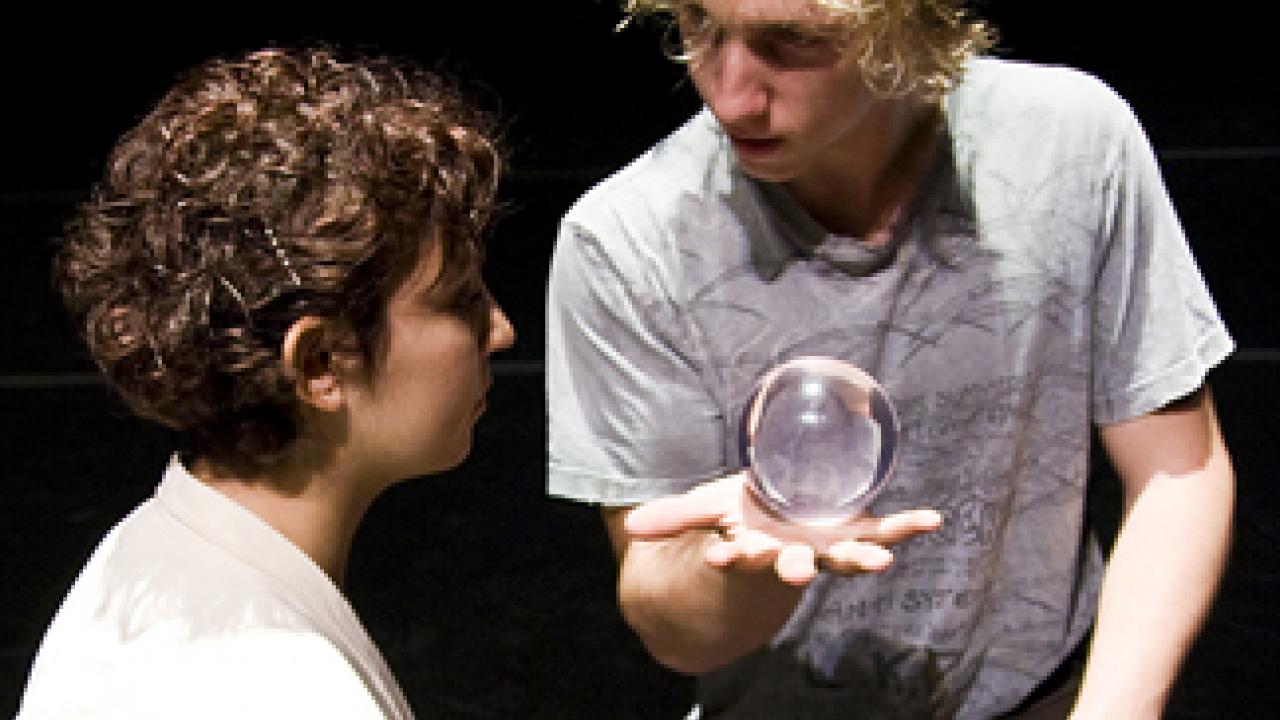Guillermo Gómez-Peña and Sara Shelton Mann “are expanding and redefining the boundaries of performance and theater for our students as well as our audiences,” says Professor David Grenke, chair of the Department of Theatre and Dance.
“This is why we brought them here (as Granada artists in residence). They pose important questions that are political, sexual and spiritual.”
Each is responsible for one-half of a double bill of performance pieces that open Nov. 18 and continue through Nov. 22.
Corpo-Ilicito: The Post Human Society 6.9
Gómez-Peña, a writer and performance artist, uses the human body as a site for political reinvention and poetic prophesying in Corpo-Ilicito: The Post Human Society 6.9, an ever-changing performance installation that explores what our society has inherited from the Bush administration while attempting to manifest a possible future without resorting to quick fixes and false hopes.
“As live artists, our task is to create living metaphors that articulate a new aesthetic, culture, spirituality and a sexuality that emerge out of the ruins of our Western civilization,” said Gómez-Peña, recipient of a MacArthur Fellows grant in 1991.
Brian Livingston, a Master of Fine Arts candidate who performs in Corpo-Ilicito, said: “This creative experience has been a bit like waking up in a dream where I’ve jumped out of an airplane not knowing if I remembered to put on a parachute on or not. Guillermo impels collaborators to follow their impulses into the multiplicity of meaning and impact.”
Three other MFA candidates perform in Corpo/Ilicito: Jess Curtis, Karl Frost and John Zibell, who also serves as assistant director. Performer-collaborators also include Praba Pilar, a doctoral candidate in performance studies; and Larry Bogad, associate professor in the Department of Theatre and Dance, co-founder of the Clandestine Insurgent Rebel Clown Army and a performer with the Yes Men, the Oil Enforcement Agency and other political theater groups.
Every performance is different, according to a news release from the Department of Theatre and Dance, as Gómez-Peña and his UC Davis performers" create a setting that is both live jam session and reflective zone."
"The full environment experience ultimately allows the audience to co-direct the fate of the performance by incorporating symbolically charged actions and imagery with those of the participating artists."
The audience may bring and use their cameras; even cell phones are welcome.
Corpo-Ilicito: The Post Human Society premiered in early 2009 at the Habana Biennale (Cuba) and at the Trouble Festival in Brussels. Different versions followed over the summer at Prisma in Oaxaca, Mexico; the Three Rivers Art Festival in Pittsburgh; and el Arte es Acción in Madrid.
Tribes: the unified field
Mann, choreographer, performer and teacher, is internationally recognized for her exhilarating style of performance that captures the evolution of choreographic expression — in a blend of daring, lyrical physicality and acrobatic partnering.
She described her new work, Tribes: the unified field, as a journey into the past and future, fluctuating between verbal and nonverbal language, investigating the spiritual basis of human origin beyond cultural differences.
All of her most recent works are titled Tribes, reflecting the performer-collaborators who are focused around specific goals for public presentation and personal development. The subtitle the unified field derives from the environment of the place of work, the politics of the performer-collaborator context, and the emerging stories and questions, such as “The world is burning — what did we do? What do we do now?”
Mann explained the genesis of Tribes: “I believe that our energetic bodies convey deeper-rooted messages than any culture or identity can express. These messages form stories, and these stories form the ‘performance.' My art is meant to reveal and transmit the story of our collective humanity — our potential for excellence, our danger — in a time of global change, chaos and paradigm shift. It is an antidote to fear, doubt and greed as the face of who we are.”
Student performer Tyler Eash described the Tribes process, “Sara sculpts with the materials present. Rather than creating something to execute her preconceived ideas, she webs real people into a unified theme. We are present in the performance. You won't see dancers, you'll see people, how they relate and who they are.”
Other student performers include Frank Ata-Baah, MFA choreography candidate; Cecilio Stephanie Cooper, a doctoral candidate in performance studies; first-year undergraduate Suzanne Lewis, an undeclared major in social sciences; and Avila Reese, MFA acting candidate.
Said Lewis: “Sara has taught me that the important part is the negotiation, not the destination. This process has taught me a new way to move which has inspired me to think in a new way.”
Reporting by Janice Bisgaard, publicity manager for the Department of Theatre and Dance.
AT A GLANCE
WHAT: Double bill of works by the fall quarter artists in residence in the Department of Theatre and Dance.
• Guillermo Gómez-Peña’s Corpo/Ilicito: The Post-Human Society 6.9
• Sara Shelton Mann’s Tribes: the unified field
WHEN: 8 p.m. Nov. 18-21 and 2 p.m. Nov. 22
WHERE: Main Theatre
CONCEPT ARTISTS FOR BOTH PIECES:
• Lighting designer Jacob W. Nelson, MFA candidate
• Costume designer Sarah Kendrick, MFA candidate
• Scenic designer Josh Steadman, MFA candidate
• Sound designers Michelle Lam and Christian Savage, undergraduates
• Stage managers Devin Collins and Sarah Norton, undergraduates
TICKETS are available through the Mondavi Center box office: (530) 754-2787 or (866) 754-2787 or mondaviarts.org.
ADVISORY: This production may contain nudity, adult language and blatant sexuality.
Media Resources
Dave Jones, Dateline, 530-752-6556, dljones@ucdavis.edu
